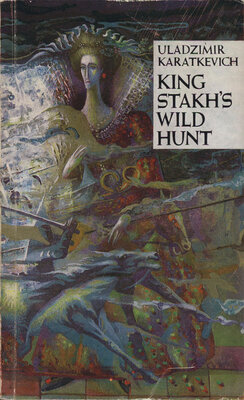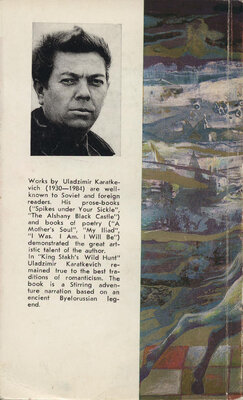King Stakh's Wild Hunt
Уладзімір Караткевіч
Выдавец: Мастацкая літаратура
Памер: 248с.
Мінск 1989
So amazed was I by this last event that I almost missed the housekeeper’s return. She was walking with a candle, holding some kind of a sheet of paper in her hand. I pressed myself into the niche in the door, she passed me by, stopped at the window, shook her head, muttering something, and shut it.
Then she began to go down the stairs to the first floor.
What had she been looking for, here at the top? I was about to go into my room, but suddenly stopped and quietly knocked at Yanowskaya’s door. You never can tell, maybe it was she who had been in the corridor? I whispered:
“Miss Nadzeya, are you asleep?”
In answer I heard a sleepy muttering.
I returned to my room and without lighting a candle, sat on my bed. I was shivering with cold and wracking my brain trying to find an answer to all these contradictory thoughts.
CHAPTER THE SEVENTH
When Miss Yanowskaya and I were taking a walk in the alleyway of trees the following day, I told her about what had occurred the previous night. Perhaps I should not have done that, I don’t know, but I could not rid myself of the thought that there was something suspicious about the housekeeper. She was not surprised, looked at me with her large, meek eyes and slowly answered:
“You see, I was so worried about you that I couldn’t fall asleep for a long time. And later I was so exhausted that I heard nothing. You shouldn’t get up at night, Mr. Belaretzky. If anything should happen to you, I’d never for
give myself. You’re mistaken about the housekeeper. As a matter of fact she can go about anywhere and everywhere. I don’t keep to the old rules that a housekeeper must come up to the second floor only when she is called upon. She is not the worst thing here, it is the Ladyin-Blue. She has appeared again. Something bad will occur most assuredly.”
And with austere courage she added:
“It will be a death most likely. And I have every reason to believe that it is I who is to die.”
We were sitting in the old, abandoned summer-house. Time had covered the stones with moss that after the rain was freshly green again. In the middle of the summer-house was a girl in marble with an ear missing, and a snail was creeping over her face. Miss Yanowskaya looked at the statue and sadly smiled.
“There, and that’s how it’s with us. The abominable desolation of our lives. You said that you didn’t quite believe it might have been a ghost. I don’t agree with you. But even if it were so — what difference does it make? Isn’t it all the same what you are suffering from, if suffer you must to atone for sins?”
“You have atoned for them these two years...” I began.
However she paid no attention.
“People fight as spiders do in a jar... The gentry is becoming extinct. We were, formerly, as strong as stone, whereas now... You know, were we to chop off a piece of stone from this old building, slugs would be found there. Who knows what it is they feed on there? Should you strike something against this stone it will fall to pieces. The same with us. Well, let them strike—the sooner the better.”
“And you will not regret the loss of such
beauty?” I said pointing to the house and everything around.
“No. My only wish is that it should come the sooner. I’ve long been ready to disappear together with this hole. I’d have no regret, either for it or for myself. But I’ve begun to notice lately that I’m slightly worried about life, that I should regret its loss, it’s probably not so bad as I had thought it. There may be some sense in believing in the sun, in friends, in the budding of the trees, in bravery, and in faithfulness.”
“It’s a good thing that you have begun to think so.”
“No, it’s very bad. It’s a hundred times more difficult to die loving life than to die believing it to be what I had formerly supposed it was. Previously, my soul was habitually in a state of fright. Now it is changing into something that I have no name for, something that I have no wish for. And all because I have begun to believe a little in people. This belief is unnecessary. Unnecessary this hope. It was better and calmer the way things were previously.”
We kept silent for a while. She bent down to a branch half fallen down from a maple tree and ran a hand over it.
“People don’t always lie. I’m very grateful to you, Mr. Belaretzky. You must forgive me for having listened to your conversation with Svetilovich. Such a kind and pure soul, the only real person in this district besides yourself, and yes, perhaps my dear uncle. I’m thankful that not everywhere do people have more nerve than brains.’
“By the way, about Dubatowk. What, in your opinion, must I do? Shall I tell him everything
and then together we could begin to expose all the abominations?”
Her eyelashes quivered.
“No, don’t! He is a very good man. He has a hundred times proved his devotion and faithfulness to our family. He didn’t let Garaboorda bring an action against us for a promissory note when my father was still alive, and the means he used were not quite proper: he called out Garaboorda to fight a duel and said that all his relatives would call out Garaboorda as long as he lived. And that’s why I’d not wish to have Dubatowk interfere. He’s too hot-tempered, this dear uncle of mine.”
Her eyes were thoughtful and sad, but suddenly brightened.
“Mr. Belaretzky, I’ve long wished to say this to you. After our talk last night, when you swore your oath, I realized there was no time to be lost. You must leave Marsh Firs, leave it today! At the latest — tomorrow, and return to the city. Enough’s enough! The violins have played their song, the fineries have been put away. Death has its own laws. There is nothing you can do here. Leave us, leave this house that the centuries have been covering with filth, leave these despicable people and their crimes to what best fits them: the night and the rain. You are too much alive for all this. And you are a stranger.”
“Miss Nadzeya!” I exclaimed. “What are you saying? I’ve already been reproached here, have already been called an outsider. Could I have expected to hear this cruel word from you, too? What have I done to deserve it?”
“Nothing,” she answered dryly. “But it’s too late. Everything comes too late in the world.
You are too much alive. Go to your people, to those who are alive, who go hungry and can laugh. Go and conquer. And leave the graves to the dead...”
“But aren’t you my people?” I exploded. “And these people, frightened and hungry, aren’t they my people? And Svetilovich, whom I shall have to betray, isn’t he of my people? And thest god-forsaken swamps where abominable things occur, aren’t these swamps my land? And the children crying at night when they hear the hoofs of the Wild Hunt, trembling with fright all their lives, aren’t they my brethren’s children? How can you even dare suggest such a thing to me?”
She wrung her hands.
“Mr. Belaretzky, don’t you understand it’s too late to awaken this land, and me, too? We are tired of hoping. Don’t awaken new hopes in us. It’s too late. Too late! Don’t you understand that you are alone, that you cannot do anything, that your death would be an inconsolable misfortune? I should never forgive myself. Oh! If only you knew what frightful apparitions they are, how they thirst for blood, the blood of other people!”
“Miss Yanowskaya,” I said coldly, “your house is a fortress. If you drive me out, I shall go to a less dependable one, but I will not leave these parts. One of two things is necessary now... to die or to conquer. To die — if they are spectres. To conquer — if they are people. I’ll not leave this place, not for anything in the world. If I bother you,— that’s another matter. But if your request is due to your fear for me, because you don’t wish me to risk my skin — I shall remain. When all’s said and done, it’s my own skin. And I have the full right
to dispose of it to my liking. You understand that, don’t you?”
She looked at me taken aback, with tears in her eyes.
“How could you, even for a moment, have thought that I don’t wish to see you in this house? How could you have thought that? You are a courageous man. With you I feel safe. Finally, I feel safe with you, even when you are as rude as you have just been. An aristocrat would not have put it that way. The gentry are such gallant men, refined, subtle, are able to hide their thoughts. I’m sick to death of all that. I wish to see you as you were yesterday, or...”
“Or killed,” I finished. “Don’t worry. You shall never see me like that again. My weapon is with me. And now, it is not I who will flee from them, it is they who shall flee from me, if there is a drop of blood in their incorporeal veins.”
She arose and left the summer-house. At the very exit she stood a moment, turned around and, looking down at her feet, said:
“I didn’t want you to risk your life. My wish was very great. Though after hearing your answer, my opinion of you is a hundred times better. But be careful. Don’t forget to carry a weapon with you. I... am glad that you do not want to take my advice and have decided to remain. And I agree with you that one must help the people. The danger threatening me is a trifle in comparison with the peace of mind of the people. They perhaps are more deserving of happiness than those living in the sunny valleys, because they have suffered more in anticipation of it. And I agree with you: one must help them.”
She left, while I remained sitting for some time yet, thinking about her. To meet with such nobility and spiritual beauty in this remote corner was a startling experience.
You know how it uplifts a person and strengthens him to feel that he is being depended upon as on a stone wall. But evidently, I knew myself badly, for the memory of the following night is one of the most awful and unpleasant ones in my life. Ten years later, recalling it, I groaned with shame, and my wife asked me what was wrong. But I never, to this very day, have ever told anybody about that night or what I thought then.
 КНІГІ ОНЛАЙН
КНІГІ ОНЛАЙН


